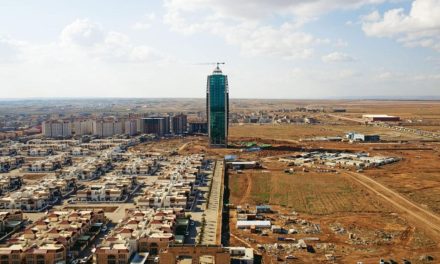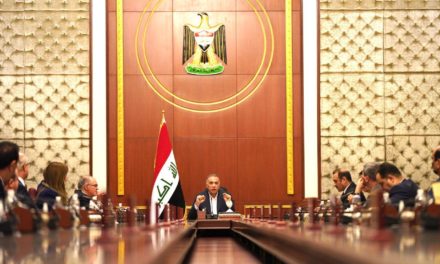(Photo: Ahmed Dhahi/Reuters)
With the escalation in tensions between Iran and the United States, it appears that the fragile internal consensus in Iraq to form a new government has become more complicated than ever before, to the extent that it could plunge the political situation in the country into a worsening downward spiral.
The initial reaction to the assassination of the Quds Force’s commander Qassim Soleimani by a U.S. airstrike on Iraqi soil was one of anger and a deep sense of grievance in Tehran and one of trepidation in Washington of yet another war flaring up in the Middle East. In the immediate aftermath of the airstrike, several countries, including Saudi Arabia, insisted to both parties the need to exercise restraint because it was generally accepted that any form of Iranian reprisal would undoubtedly be met with a severe military response by the United States. However, the anticipated American response did not materialise despite Iran’s attack against two U.S. military bases in Iraq. Given the domestic problems facing President Donald Trump with the impeachment proceedings and his unwillingness to go to war, Trump refrained from responding. In a speech at the White House, Trump said that no American had been hurt in the Iranian attacks on the military bases in Iraq, and even hinted that Washington may not immediately retaliate to these attacks.
Following the air raid by the United States on targets located on the outside perimeter of Baghdad International Airport and the assassination of Soleimani, the commander of the Quds Force, and Abu Mahdi Al-Muhandis, the deputy head of the PMF, the main parliamentary Shi’a blocs in Iraq adopted a non-binding decision to end the presence of US and other foreign forces in Iraq. Meanwhile, the majority of Sunni and Kurdish members of parliament boycotted the parliamentary session specially convened to vote on a decision to end the presence of foreign forces in Iraq. Outgoing Prime Minister Adil Abd Al-Mahdi found himself forced to ask the United States to send a committee to conduct dialogue on the conditions of the troops’ withdrawal from Iraq, despite his desire to hold the U.S. to account for the attack.
Washington’s response was clear beforehand. It refused to withdraw its forces from Iraq. In a statement by a spokeswoman for the U.S. State Department, Morgan Ortagus, it was made clear that at the present time, any delegation sent to Iraq would be solely dedicated to discussing how best to recommit to the strategic partnership between the two countries—not to discuss troop withdrawal.
Iraq’s Role in Regional Stability
In the years following the 2003 invasion, successive governments in Iraq sought to find a credible balance in their relations with Iran and the United States for a very legitimate reason. Iraqi national security interests require the presence of the United States in Iraq; whilst U.S. national interests and foreign policy view any downgrading of their presence in Iraq will also result in a corresponding shrinkage in the overall Western presence in the country. This in turn will mean that almost all of Iraq’s assets will become more closely linked to Iran and even possibly Russia and China.
In the past, Adil Abd Al-Mahdi’s government had demonstrated relative progress in its efforts to curtail the political disputes between the respective Shi’a, Sunni, and Kurdish elements in the legislative councils. However, as the future of the presence of American military forces in Iraq became a cause for political tension, the severity of the hostility between the various political parties towards the blocs aligned with Iran increased. Consequently, the issue of the future presence of American forces took front stage as a major topic for debate between the political parties, and it appears that the gulf is gradually widening between the Kurds and Sunnis, on the one hand, and the Shi’as, on the other.
For their part, the United States has resumed its military operations in Iraq. It decided unilaterally to continue its military mission in Iraq and has opened talks with Baghdad about installing the Patriot missile system. There is also no doubt that the United States will capitalize on its support for the Kurds and the Sunnis. In contrast, Iran is facing an uphill struggle to find a suitable candidate who will wield for it the same sort of influence previously enjoyed by Soleimani with its neighbour Iraq, to enable it to forge close links with the next Iraqi government, which in all likelihood will be formed by Prime Minister-designate Mohammed Tawfik Allawi.
Iran’s Opportunities in Post-Elections Iraq
Anti-Iran sentiments in popular demonstrations soon turned into anti-American sentiments. Many Iraqis accuse the United States of violating Iraqi sovereignty by carrying out airstrikes on Iraqi soil. However, Iran’s arc of influence in Iraq has been seriously dented. While Iran faces serious economic problems at home as a result of the U.S. sanctions, American private companies and Arab companies in neighbouring countries, such as Saudi Arabia, which are seen as major competitors to Iran, have started investing in Iraq. After all, the economic crisis in Iraq was the main reason for the outbreak of popular protests. Investments and the injection of capital by regional and international players are additional factors in reducing Iran’s influence in Iraq.
Iran does not consider its influence in Iraq as being necessary solely for its national security, but also as a means for circumventing U.S. sanctions. Iraq’s exemption from the sanctions imposed by the United States on Iran in the fields of natural gas and electricity imports end in February. The Government of Abd Al-Mahdi played a major role in persuading the Trump administration to exclude Iraq from sanctions on Iran in the field of energy. It is not yet clear if the new government will have enough power and the political will to do the same. After being appointed Prime Minister-designate by President Barham Salih on 1 February, the probable new Prime Minister Allawi will lead the country until early elections can be held. Until then, it does not appear that Iran will have many opportunities to regain its influence in Iraq, whereas America will use every means at its disposal to exploit every available opportunity to the maximum and even possibly compensate itself for some of the heavy losses it has suffered in its war on Iraq.

Hayder Al-Khafaji
Hayder Al-Khafaji is a researcher on Middle Eastern affairs with a specialist focus on Iraq-Iran relations. He holds a postgraduate certificate in Islamic Studies from Birkbeck College, University of London, and a master’s degree from Middlesex University where he is currently completing a Professional Doctorate in Muslim cultures.










